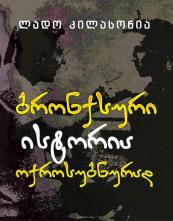A BRONX STORY, TOLD IN TBILISI’S GOLDEN-QUARTER-STYLE
KILASONIA LADO
This book by Lado Kilasonia is a collection of stories, but even more fragments of one entire narrative, novel-like episodes. As the title suggests, these are stories of Tbilisi’s ‘Golden Quarter’ district, and in them the characters and stories are probably real. They recur from story to story and tell a continuous narrative, one general history, one life – as lived on the streets, in a human way, over the years, divided into death and life. There is plenty of aggression in the book, but this is not the controlling element, but a different sort of force, which may turn out to be even greater, if a man shows this force in his own person and then passes it on to others. The times, however, give rise to injustice and evil, which the author calls the ‘time of fatherlessness’. The heroes of the story give the same name to the grey 1990s, when Lado and lads of his generation were children. When a boy most needs a father is the time when their fathers are fighting in the civil war, or in Abkhazia, or in South Ossetia, if they haven’t fled abroad to earn money, or aren’t on drugs, or in prison. The stories told in this books begin in the past, when impressions were most acute, in childhood. Such a hero as Maro Bebo (The Kerosene Fairytale) is at the same time evil and good. So are the other characters who, when they cannot find goodness in man’s world, establish a connection with creatures of nature. But in the end, the book’s overall atmosphere is ‘Bronx and the Golden Quarter’, or stories about lads, both good and bad – material for a film, if any director would like to concoct an appealing blockbuster about the unbearable lightness of the 1990s…
‘The author chooses themes and things that he knows and which are close to him, yet are so much personally experienced and endured that the reader is almost a participant or a spectator of these stories, which the young writer tells us so succinctly and simply. Lado Kilasonia’s narrative manner is direct and full of humour, at the same time this humour is good-natured and positive and unalloyed, the narration is dynamic and full of zest, so many feelings come over you that it seems to have happened before your own eyes. With your participation and shared feelings, the book’s heroes become people very close to you, with their own weaknesses and amazing personal charm.’
‘It is an unforgettable journey up a river: to the source, to the past of your own country; every bend in the river thrusts the heroes into a new ordeal. The narrative’s free-ranging and masterful style is like that river and provides the reader with many pleasant surprises. ‘May the unbeliever not find me!’ This is an adventure novel written with rare craftsmanship..’
Extract will be available soon
In case of using the information, please, indicate the source.
‘The author chooses themes and things that he knows and which are close to him, yet are so much personally experienced and endured that the reader is almost a participant or a spectator of these stories, which the young writer tells us so succinctly and simply. Lado Kilasonia’s narrative manner is direct and full of humour, at the same time this humour is good-natured and positive and unalloyed, the narration is dynamic and full of zest, so many feelings come over you that it seems to have happened before your own eyes. With your participation and shared feelings, the book’s heroes become people very close to you, with their own weaknesses and amazing personal charm.’
P. Kushitashvili, literary critic
‘It is an unforgettable journey up a river: to the source, to the past of your own country; every bend in the river thrusts the heroes into a new ordeal. The narrative’s free-ranging and masterful style is like that river and provides the reader with many pleasant surprises. ‘May the unbeliever not find me!’ This is an adventure novel written with rare craftsmanship..’
A. Kikodze, author
Extract will be available soon
In case of using the information, please, indicate the source.
